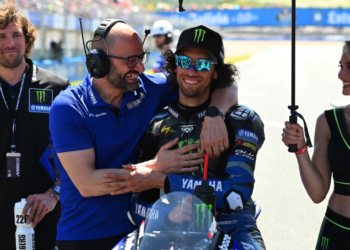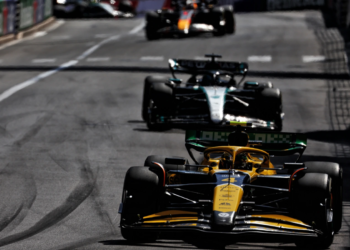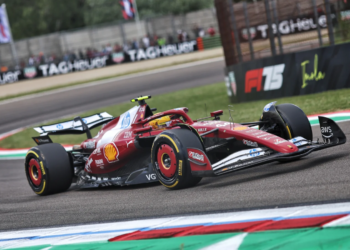Marc Marquez reached new highs in 2018 as he took his seventh world title, his fifth premier class trophy in the space of just six years, setting new records along the way. Motorsport Week reflects on his journey to yet another championship.
Marc Marquez was twice accused of ‘destroying’ by MotoGP rivals in 2018.
After their tangle in Argentina, Valentino Rossi claimed the Repsol Honda rider had “destroyed our sport”, while future team-mate Jorge Lorenzo said he “destroyed my race and my foot” after a 'coming together' on the opening lap of the Aragon race.
Sensationalist claims from both of them.
But Marquez did destroy in 2018. He destroyed the competition. He utterly decimated them in a campaign almost reminiscent of his 2014 romp.
Nine wins and a 76-point advantage at the end of the season, a fifth top tier title in six years and a seventh across all classes secured with three races still to run. Dominant, definitely. But easily done so? Far from it.
For 2018 was a year which was perhaps the most competitive in this golden age of MotoGP. In five races this year the top 15 – the points scorers – were covered by the closest margins in history, as the machines and riders converged.

In terms of threat, Ducati produced its most complete Desmosedici, with Andrea Dovizioso and Jorge Lorenzo taking seven wins for the marque.
After Dovizioso challenged Marquez through to the final round of the 2017 season, ultimately coming up short in runner-up spot, he came into the new year as favourite. A strong pre-season aboard the GP18 did nothing to quell such predictions. Honda had to respond over the winter.
Marquez had been able to take two difficult-to-manage RC213Vs to the previous two titles, but mistakes from Yamaha in 2016 and several bogey circuits hindering Dovizioso last year gave the Spaniard just enough breathing space to mask the bike's pitfalls with his unearthly talent.
The key area for Honda to improve was the engine. A switch to a big-bang firing order for 2017 took a period of adjustment, but by the second half of the campaign Marquez hit his stride. Further improvements were still required. Honda delivered. Dovizioso won at Qatar, but only narrowly, and he knew then the upturn of performance from Honda and Marquez at a circuit where the partnership had previously been less-than-outstanding was a concern.
The events of Marquez's Argentina implosion, where he clattered his way through the field with his vastly superior pace following an early ride-through penalty for failing to start from pitlane when his bike stalled on the grid, did not haunt him for long. From Austin to Le Mans, he was unstoppable. A tumble at Mugello proved just a blip, as he went onto finish second at Catalunya before taking back-to-back wins in the Netherlands and Germany to take a 46-point lead into the summer break. After just nine races the title fight was already over.
Dovizioso was a low-key sixth in Argentina and fifth at Austin, and at Jerez crashed while battling for the podium with team-mate Jorge Lorenzo and Marquez’s Honda stablemate Dani Pedrosa. At Le Mans he fell moments after taking the lead, and hit the deck again two rounds later in Barcelona while sitting third. In one swoop, a minimum 61 points were lost by the Italian. At the summer break, he would have been just 15 behind instead of 77.
From the Czech Republic through Thailand, Dovizioso and Marquez both scored 106 points, with two wins, two seconds and a third each. Going to Japan, Marquez's advantage would have stood at just 16 instead of 77.
Marquez suffered two DNFs in the final four races, but won twice. Dovizioso dumped it late on at Motegi, and was third in Australia, sixth in Malaysia and victorious at the finale in Valencia. Even without his trio of early-season crashes, Marquez could not be caught by the Ducati man, who hailed the Spaniard's campaign as “special”.
In an ordinary season, that is an impressive fact. But there was an underlying problem hindering Marquez throughout the campaign, as a shoulder dislocation sustained during training earlier in the year meant at times he was not riding to his full potential.
“This year I dislocated the shoulder at the start of the season while training at home, with the motorbike,” Marquez said in a motogp.com interview. “Then again at the circuits with some crashes, and then every time [it was dislocating] easier. I lost a lot of time from my training, [lost a lot] of my life with the shoulder this year. And it's true in the last part of the season, the second part of the season, it was on the limit.”

Marquez kept his injury hidden for most of the season, though it became plainly obvious in Valencia when he dislocated it twice in crashes in qualifying and the race that something was wrong. It has since been operated on, and rehabilitation is underway.
But even Dr. Xavier Mir, who operated on Marquez, expressed his amazement at the champion’s achievements. “I do not understand how he managed to win the world championship with such an injury,” Mir told Spanish outlet Marca. “It is to his credit that he won, as his injury was very complicated.”
While Honda made an obvious step forward with the RC213V this year, it clearly has progress to make in order to deliver a completely user-friendly machine. LCR’s Cal Crutchlow was the only non-Marquez rider to triumph for Honda this year, in the crazy topsy-turvy Argentine affair, and added just two further rostrums to that tally. Pedrosa, in his final MotoGP season, could not even get close to the podium, finishing a best of fifth. Ducati’s GP.18 took seven wins in the hands of Dovizioso and Lorenzo while the pair – along with Pramac’s GP18-mounted Danilo Petrucci – added another seven podiums. Even Yamaha, in one of its worst seasons of the four-stroke era, managed more non-victory podiums than Honda, with Maverick Vinales and Valentino Rossi combining with nine. Suzuka duo Alex Rins and Andrea Iannone achieved a similar feat.
Arguably, Ducati had the best bike this year. Honda had something that could match it consistently, but only really in Marquez's hands, and this was despite carrying a worsening injury in an ultra-competitive season.
Inevitably, the debate surrounding Marquez's status as the GOAT (Greatest Of All Time), a title many fans have long-associated to his bitter rival Rossi, began as soon as the Honda rider wrapped up his fifth premier class title at the age of just 25. Rossi was 26 when achieved this back in 2005, incidentally his fifth in six seasons. Of course, the Italian's titles came on Honda and Yamaha machinery. Does this make Rossi more qualified for GOAT status than Marquez? The opinion will remain split until the end of time.
The argument that a rider or a driver must win with multiple constructors to be truly hailed a great is a flimsy one at best. Marquez's fellow five-time World Champion Mick Doohan took all of his 500cc titles on Hondas, and this came in the wake of a horror leg injury suffered in 1992. Kenny Roberts won his three-successive 500cc crowns in his first three years in Grand Prix racing aboard Yamahas. Both are rightfully hailed as legends.
Marquez may have won all of his MotoGP crowns aboard HRC machinery, but in the last three years they have been far from the company's finest. The 2016 bike simply was not good enough to win a title, yet Marquez did, and with three rounds to spare. The 2017 bike, in the first half of the year, sucked the joy of racing from the Spaniard and stressed him so much he began to suffer hair loss. Yet, he was able to get the bike to the place he needed it and he won the title.
This year, the RC213V was better than it had been, but it still proved difficult. Yet, despite injury, despite the stiffest of competition, Marquez still triumphed.
If that does not warrant GOAT status, nothing ever will.






